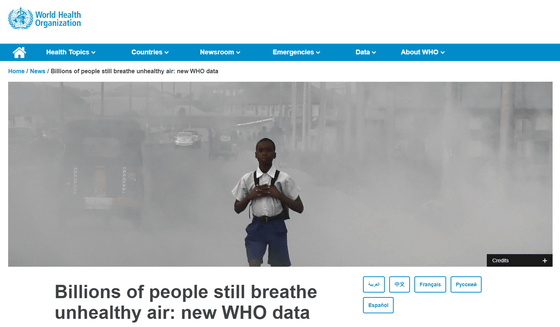WHO announces that '99% of the world's population breathes air that is more polluted than the standard.'

On April 4, 2022, the World Health Organization (WHO) announced the results of a survey that almost the entire population (99%) of the world lives in air that exceeds the air pollution standards set by the organization. WHO argues that the use of fossil fuels should be curtailed, especially as people living in low- and middle-income countries live in the worst air pollution.
Billions of people still breathe unhealthy air: new WHO data

This WHO announcement is based on the contents of the 2022 edition of the ' Air quality database ' that summarizes the air quality measurement results compiled from 6000 cities in 117 countries around the world published by the organization. All things. According to WHO, the 2022 Air Quality Index database included for the first time the average annual concentration of nitrogen dioxide on the ground and measurements of particulate matter such as PM10 and PM2.5.
Nitrogen dioxide is said to cause environmental pollution as a precursor of ozone and cause respiratory diseases and asthma. Particulate matter, especially PM2.5, penetrates deep into the lungs and enters the bloodstream. In addition to being said to cause adverse effects on the respiratory tract in addition to cardiovascular disease and stroke, research results have also been reported that it causes other illnesses. According to the 2022 survey results, which include the measured values of these pollutants as new targets, 17% of cities in high-income countries exceed the PM10 / PM2.5 standard values set by WHO, but they are low. 'Less than 1%' in middle-income countries. On the other hand, there was almost no difference in nitrogen dioxide between high-income countries and low- and middle-income countries, and the air quality that met the nitrogen dioxide standard was only 23% of the total.

These results reiterate the importance of taking concrete steps to reduce air pollution levels, WHO claims. Specific steps include revising domestic air quality standards in accordance with WHO air quality guidelines , identifying causes of air pollution, supporting the transition to clean household energy, and safe and inexpensive public transport. We are calling on government agencies in each country to take measures such as building an engine network, a pedestrian- and bicycle-friendly network, and tightening vehicle emissions.
Related Posts:
in Note, Posted by darkhorse_log







